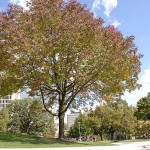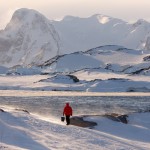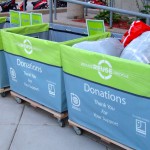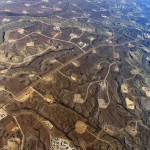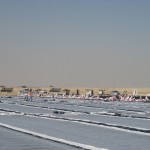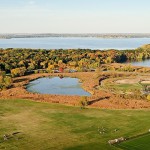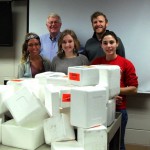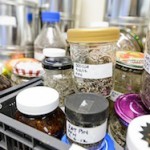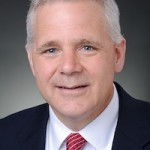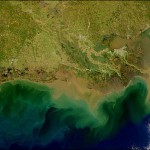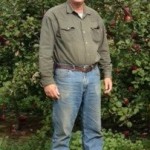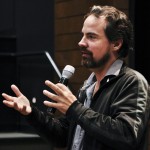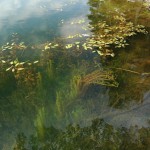Tag Environment
Campus begins treating for emerald ash borer
Crews will soon begin treating 17 ash trees across campus for emerald ash borer, an exotic wood-boring beetle that is known to attack ash trees in North America. In November 2013, it was confirmed found in Madison.
Climate conundrum: Conflicting indicators on what preceded human-driven warming
When the Intergovernmental Panel on Climate Change recently requested a figure for its annual report, to show global temperature trends over the last 10,000 years, the University of Wisconsin–Madison’s Zhengyu Liu knew that was going to be a problem. Writing in the journal Proceedings of the National Academy of Science today, Liu and colleagues describe a consistent global warming trend over the course of the Holocene, our current geological epoch, counter to a study published last year that described a period of global cooling before human influence.
Movers encouraged to donate and recycle to reduce waste and mess
As the mid-August downtown leases turn over, overflowing dumpsters and buried curbs contain many items that can be reused or recycled. In an effort to reduce landfill waste and increase community benefit, the UW–Madison WE CONSERVE program and Office of Sustainability are partnering with the City of Madison, Goodwill Industries, Society of St. Vincent de Paul and student organization REthink Wisconsin to collect and donate reusable items.
Drilling in the dark: Biological impacts of fracking still largely unknown
As production of shale gas soars, the industry's effects on nature and wildlife remain largely unexplored, according to a study by a group of conservation biologists published in Frontiers in Ecology and the Environment on August 1.
UW researchers create safe, resistant material to store waste
Storing industrial waste has never been a pretty job, and it's getting harder.
Three new studies to take a look at angles related to Wisconsin water
Three new research projects, all based at the University of Wisconsin–Madison, will each take a look at a specific angle related to the state’s water supply and use, including one study specifically studying Madison’s water for the presence and effects of manganese.
Mobile sustainability game spurs students to take environmental action
Traversing the University of Wisconsin–Madison campus while consulting iPads and smartphones, the students in Cathy Middlecamp’s introductory environmental studies course could have been mistaken for anyone checking social media en route to class. But for these students, class was already in session. Middlecamp, a professor in the Nelson Institute for Environmental Studies, partnered with the UW Mobile Learning Incubator to have students in Environmental Studies 126 playtest a new mobile game under development that explores sustainability features on the UW–Madison campus.
Possible futures for the Yahara Watershed to be unveiled at public event
The Yahara Watershed is a unique and vibrant part of south-central Wisconsin. It is home to the state capital, 370,000 people, 170,000 acres of productive farmland, and four beloved lakes - Mendota, Monona, Waubesa and Kegonsa.
UW–Madison Styrofoam reuse and recycling program wins competition
A team of University of Wisconsin–Madison undergraduates has won a $90,000 award to expand a novel Styrofoam reuse and recycling program in the Madison area.
Arboretum’s seed-cleaning volunteers far from dormant during cold months
The rhythms of nature time the sprouting of seeds with a litany of cues — physical and chemical changes brought on by fire and frost and even the teeth and acid of a browsing animal’s digestion.
Competition seeks interdisciplinary solutions to climate change
A new competition to spark innovative solutions related to climate change and its impacts is kicking off Friday, April 4 at the University of Wisconsin–Madison.
Excess nitrogen in water prompts March 28 summit
Concern about excess nitrogen getting into the state's waterways and drinking water is the impetus for a Nitrogen Science Summit March 28 on the University of Wisconsin–Madison campus.
Actress Rosario Dawson to keynote Nelson Institute conference in April
Actress and activist Rosario Dawson, cofounder and chair of the voting rights organization Voto Latino and an international advocate for women's rights and environmental quality, will keynote the eighth annual Nelson Institute Earth Day Conference on Tuesday, April 22 in Madison.
Water systems research fills in the details for Africa’s largest dam
When the government of Ethiopia finishes building the Grand Ethiopian Renaissance Dam (GERD) in 2017 or 2018, it will not only have built the largest hydroelectric power-generation plant in Africa, but also stirred up tensions among African nations, and indelibly altered a river that itself has guided millennia of human history in the region.
Student films to be screened at Nelson Institute’s ‘Tales from Planet Earth’
A collaborative class on environmental filmmaking is helping some UW–Madison students learn to tell stories in a whole new way.
Study challenges prevailing view of invasive species
Zebra mussels. Asian carp. Kudzu. Chances are you recognize these names as belonging to invasive species - plants or animals that are relocated from their native habitat to a foreign land, only to prove so prolific that they take over their new home. Except that's not how the story usually goes, according to a new study.
Film festival explores environmental futures amid rapid global change
Profound questions about possible futures - precipitated by a changing climate, shifting energy resources, and the movement and displacement of people across the globe - will be explored during the Tales from Planet Earth film festival in Madison Nov. 1-3.
Scientists find early warning indicators of major ecological change
Day after day, the buoy bobbed at the surface of Peter Lake. Every five minutes, or 288 times a day, instruments in the water silently recorded samples without creating so much as a ripple. But, beneath the surface, the lake - just across Wisconsin's northern boundary in Michigan's Upper Peninsula - was in turmoil. The buoy was busy documenting massive change.

